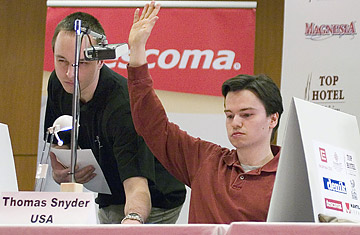
Harvard University student Thomas Snyder wins the world sudoku championship in Prague, March 3, 2007.
"You need to be flexible in what you are doing," Snyder says later, still bobbing with enthusiasm as he explains his passion for difficult puzzles, his fingers piercing the cells of an imaginary round-shaped brain-twister in the air. I'm barely able to keep up with his detailed demonstration, before he concludes, with a broad smile: "You find a better way like that, and that's what I like about solving puzzles."
When he's not conquering the (sudoku) world, this preppie-looking, confident 27-year-old from an education-cherishing family is months away from earning a Ph.D. in chemistry. There's no point in my taking notes as he explains his dissertation. I did manage to glean from his complex exposition that he is investigating "new methods of doing chemical reactions that are very different from those you can imagine."
Sudoku, according to the tournament's organizers, was invented by a Swiss scientist in the 18th Century, although it got its name from the Japanese firm Nikoli, which began publishing the puzzle in the mid-1980s. The father of the contemporary craze is said to be former Hong Kong judge and New Zealand puzzle enthusiast Wayne Gould, who several years ago persuaded a bunch of large-circulation newspapers to run sudoku puzzles generated by a computer program of his own creation. And the rest, as they say, is history.
Czech President Vaclav Klaus, who enjoys showing off his intellectual abilities, admits that for the past three years, he is doing more sudoku than reading to relax before bedtime. A patron of the championship, Klaus cruises the room giving interviews and taking pictures with a members of some of the 32 national teams competing for international honor. The most visible of them is easily the Slovak team, whose shawls in national red, blue and white seem better suited for a soccer game.
While working the room for the cameras, Klaus engages in some puzzle chit-chat with Jana Tylova, a modest 32-year-old Czech accountant from country's industrial north who defeated Snyder at the first ever world championship held last year in the Italian town of Lucca.
"Sometimes you are just not doing well," she says with a shrug, when asked to explain why she finished only 18th this time around. "You are suffering, making mistakes, erasing a lot." The tale of her ordeal — "suffering" her way up from 37th standing after a "miserable first day" — makes sudoku sound almost like an Olympic sport.
But for many devoted puzzlers, Olympians is exactly what Tylova and Snyder are. When Tylova took the sudoku crown last year, Wayne Gould proclaimed that that the achievement being the world sudoku champion would make "the number one line in our obits," Snyder recalls. But Snyder, who has been solving sudoku puzzles since sometime between "crawling and walking," wishes to be known for something "little more relevant than putting numbers to a grid." He'd be more comfortable, he says, if in the course of his life he manages to push his sudoku world title "down to line three" of his obituary. "My goal is to be known for the science I do rather than the sudoku," he says.
